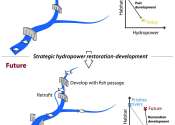DWP ratepayer advocate predicts fee increases, recommends delaying city's 100% clean energy timeline
Los Angeles residents and businesses will face higher electric bills as the Department of Water and Power transitions to 100% clean energy, according to a report by the city's Office of Public Accountability.
Jul 11, 2024
0
1









